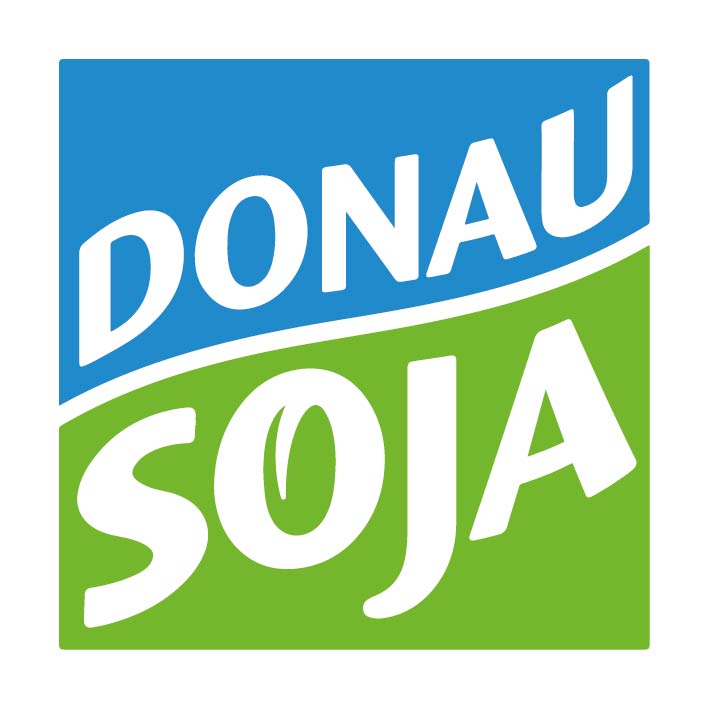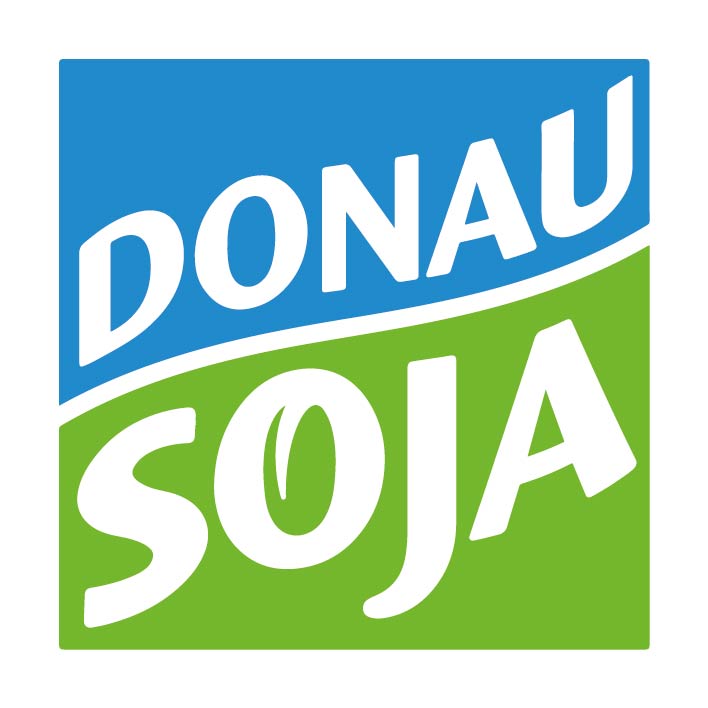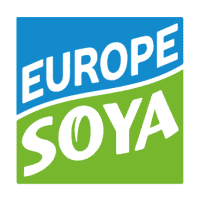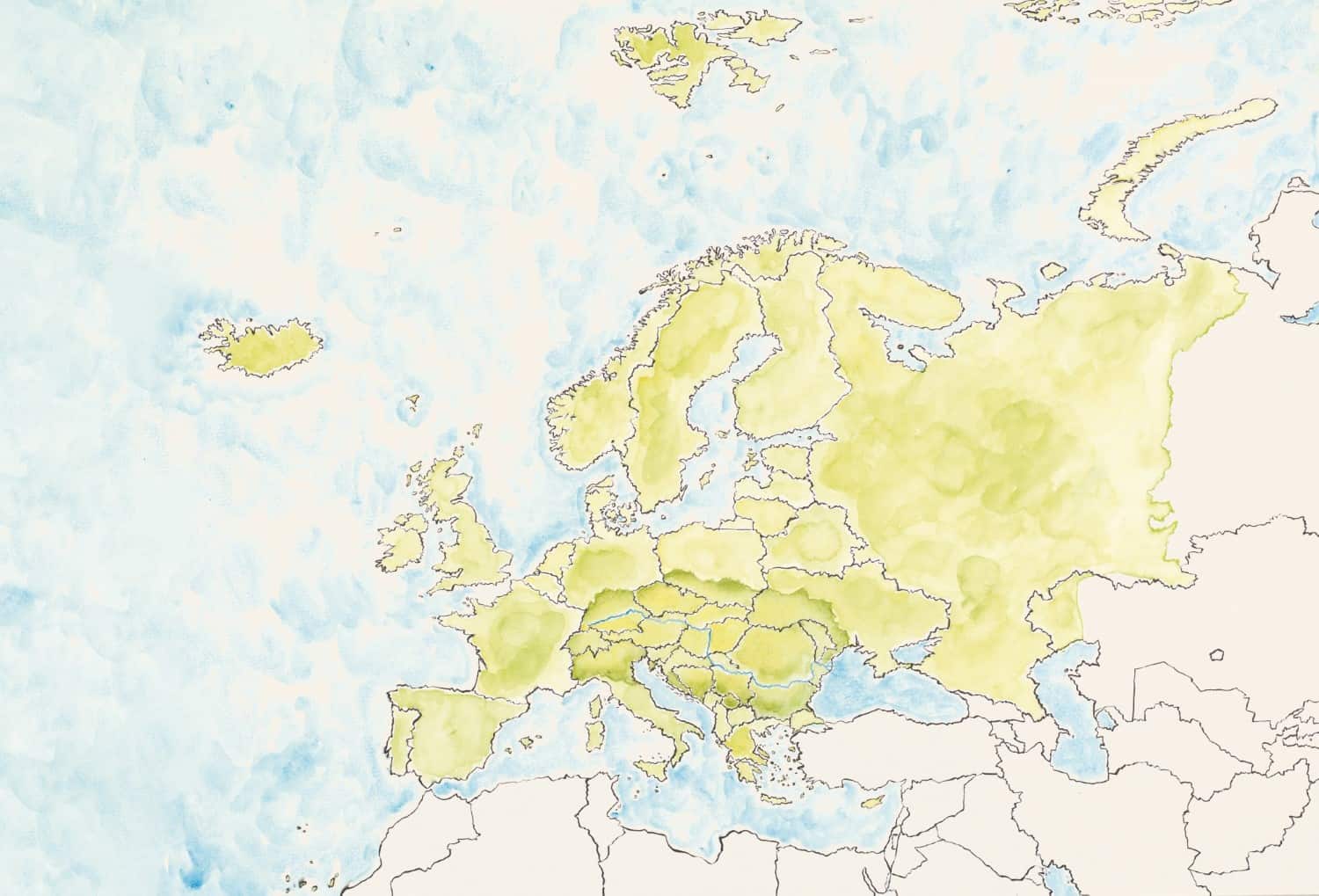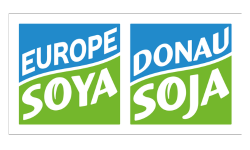Standards and Certification
The Donau Soja and Europe Soya standards are based on ten Donau Soja and Europe Soya principles of soya bean cultivation. These principles cover the essential characteristics of European origin and GM-free status, along with social, environmental and economic aspects, assuring non-GM, regional and sustainable soya. A three-staged inspection system assures the compliance of soya beans, soya food and feed with the Donau Soja and Europe Soya standards along the value chain.
The Donau Soja and Europe Soya standards and their guidelines establish minimum requirements for production, processing and labelling of Donau Soja and Europe Soya soya beans and -products.
They define the regions of soya bean cultivation, non-GMO production, and include requirements for plant protection, traceability, sustainability, and the inspection system. Donau Soja Organisation monitors and audits the Donau Soja partners together with authorised certification bodies.
Donau Soja and Europe Soya certification is also available for organic production as additional quality aspect.
In addition to the Donau Soja and Europe Soya standards, the Donau Soja Organisation also offers the Non-GMO Danube Region Standard, which is the first regional harmonised non-GMO quality standard for food in South-East Europe. It can be considered a first step towards comprehensive sustainability certification according to Donau Soja and Europe Soya standards.
Learn more about the standards
The Donau Soja and Europe Soya Standards
The Donau Soja and Europe Soya quality programmes have been established to promote the cultivation, processing, and marketing of sustainable, non-GM and origin-controlled quality soya.
The aim is to develop and guarantee a sustainable non-GM protein supply in – and from – Europe.
Donau Soja and Europe Soya are both subject to the same sustainability requirements. Donau Soja can only be applied in the Danube region, whereas Europe Soya can be applied throughout Europe.
Farmer´s decleration of self-commitment
The Declaration of Self-Commitment must be signed by every Donau Soja or Europe Soya farmer respectively and submitted to the next partner in the value chain, together with the invoice.
All Declerations of Self-Commitment for (organic) Donau Soja and Europe Soya can be found here.
MAIN CHARACTERISTICS OF DONAU SOJA AND EUROPE SOYA QUALITY
The Donau Soja and Europe Soya Standards are based on ten Donau Soja principles of soya bean cultivation. These principles cover Donau Soja’s two essential characteristics of European origin and GMO-free status, along with social, environmental and economic aspects. The most important points can be found below.
Donaus Soja: Danube region origin
Donau Soja is a product of controlled origin and quality. Farmers producing according to the Donau Soja standard are located in the Danube region as delineated by the International Commission for the Protection of the Danube River.
In order to verify the origin of the soya beans, all partners further downstream in the value chain, like traders, collectors or processors, must be in possession of a valid Donau Soja certificate and use the correct declaration on all shipping and product documentation (delivery/weighing note, invoice). Isotope testing is offered as an additional proof of origin for clients, to verify the origin of the soya beans.
Europe Soya: European origin
Europe Soya is a product of controlled origin and quality. Farmers producing according to the Europe Soya standard are located in Europe, based on the definition by Philip Johan von Strahlenberg with regard to the boundaries of the Russian border regions. In order to verify the origin of the soya beans, all partners further downstream in the value chain, like traders, collectors or processors, must be in possession of a valid Europe Soya certificate and use the correct declaration on shipping or product documentation (delivery/weighing note, invoice). Isotope testing is offered as an additional proof of origin for clients to verify the origin of the soya beans.
Non-GM status
Donau Soja and Europe Soya soya beans and soya bean products come from GMO-free cultivation using GM-free soya bean varieties listed either in the EU common catalogue of plant varieties or in the respective national catalogue of plant varieties. Donau Soja and Europe Soya soya bean farmers are not permitted to grow GM soya beans or any other GM crop. Animal feed with the quality label “Donau Soja” are suitable as feed for livestock, whose products may subsequently be marketed with the quality label “Ohne Gentechnik hergestellt” / “Produced without GMOs”.
The GMO-free status is based on the minimum requirements as set out by the following European GMO-free certification schemes:
- German EG-Gentechnik-Durchführungsgesetz (EGGenTDurchfG), with audits performed as stipulated by the German Verband Lebensmittel ohne Gentechnik (VLOG)
- Austrian Food Codex (Codex Alimentarius Austriacus) and the corresponding Leitfaden zur risikobasierten Kontrolle auf Gentechnikfreiheit (Guideline on the Risk-Based Monitoring of GMO-free Production)
- Non-GMO Danube Region Production and Labelling Standard & Non-GM Danube Region Inspection Standard.
In addition to the option of obtaining a non-GMO certification in accordance with the Austrian Food Codex, German VLOG or Non-GMO Danube Region Standards, the GMO-free status can also be verified during Donau Soja audits and certifications by checks conducted in compliance with the Non-GM Danube Region Standards, both published in 2015.
Additional environmental and social requirements:
Reduced pesticide use
Donau Soja and Europe Soya are based on EU legislation, this means that for Donau Soja and Europe Soya cultivation only pesticides whose active ingredients are approved in the EU are permitted – also outside the EU. Additionally, Donau Soja and Europe Soya ban the use of substances listed in the Stockholm Convention and the Rotterdam Convention as well as all substances, that the World Health Organization (WHO) has classified as extremely hazardous (List 1a) and highly hazardous (List 1b). Aerial spraying is prohibited in Donau Soja cultivation. Additionally, desiccation (i.e. drying down cultivated plants by means of a chemical agent to accelerate ripening before harvesting) is generally prohibited in Donau Soja and Europe Soya cultivation, not only with glyphosate, but also with all other substances such as diquat. With its own Best Practice Trainings, Donau Soja Organisation provides farmers with specific know-how on how to manage without desiccation, for example by selecting suitable varieties.
No-deforestation / No-conversion
Donau Soja and Europe Soya soya production complies with a strict no-land-use-change principle (no- deforestation / no-conversion) with a clear cut-off date: Donau Soja and Europe Soya soya shall only be cultivated on land dedicated to agricultural use no later than 1 January 2008. Donau Soja and Europe Soya soya shall not be grown in national and international nature reserves where the production of crops is prohibited. No new agricultural land shall be developed for Donau Soja soya and Europe Soya production if this would result in loss of nature reserves, natural forests, riparian vegetation, wetlands, moors, floodplains or steep slopes. Where such changes have taken place, farmers are obliged to restore protected areas to their former state.
Reduction of greenhouse gas emissions
Donau Soja provides Donau Soja and Europe Soya soya bean farmers with information on how to reduce greenhouse gas emissions and increase the sequestration of greenhouse gases. Donau Soja and Europe Soya soybean farmers record relevant data, such as yields, seed inputs, fertiliser application, pesticide application and fuel use. They select and implement specific measures to reduce greenhouse gas emissions and increase carbon sequestration.
Compliance with international social and labour rights
The Donau Soja and Europe Soya standards require farmers to comply with EU and international regulations on labour and social rights (ILO conventions). This ensures fair working conditions, including the elimination of all forms of forced or compulsory labour; the effective abolition of child labour; the elimination of discrimination in respect to employment and occupation; freedom of association; decent wages; and secure labour conditions.
Three-staged inspection system
Donau Soja and Europe Soya audits and certification are carried out by independent external certification bodies accredited in accordance with ISO/IEC 17065. To date, 18 certification bodies have been authorised by Donau Soja Organisation to conduct inspections and issue certification. This is part of a three-staged inspection system that builds on a risk-based inspection frequency. Stage one is self-monitoring within the companies, and obligatory quality assurance schemes during the processing stages. Independent certification bodies perform audits on site, issuing valid Donau Soja or Europe Soya certificates only to compliant companies. Additionally, and on a regular basis, Donau Soja Organisation performs integrity audits carried out by trained staff, or in cooperation with external certification bodies or external experts.
Donau Soja: Traceability throughout the supply chain
Donau Soja certification ensures that certified products are segregated from non-certified sources at each stage of the supply chain. For soya products, such as soya in the form of food or drinks or processed soya beans as feed, this is achieved through separation and correct declaration, both throughout the company and at every step of the supply chain. To ensure the traceability of raw soya beans, an IT-based lot certification system is in use when trading and transporting Donau Soja soya beans from the primary agricultural collector to the primary processor. Certificate of traceability may additionally be issued by the primary processor to the marketer. The traceability system comprises all certified companies registered in the Donau Soja IT database, as well as our partners who are listed on our website as certified partners.
Europe Soya: Traceability throughout the supply chain
For Europe Soya, a Quantity Equivalence System is available, meaning it can be mixed with soya that is not Donau Soja / Europe Soya certified, but is demonstrably of European origin, non-GM and deforestation-free (according to EU Deforestation Regulation).
Europe Soya certification ensures that certified products are segregated from non-certified sources at each stage of the supply chain. For soya products, such as soya in the form of food and drink or processed soya beans as feed, this is achieved through separation and correct declaration, both throughout the company and at every step of the supply chain. To ensure the traceability of raw soya beans, an IT-based lot certification system is used for trading and transporting Europe Soya soya beans from the primary agricultural collector to the primary processor. Certificate of traceability may additionally be issued by the primary processor to the marketer. The traceability system comprises all certified companies registered in the Donau Soja IT database, as well as our partners who are listed on our website as certified partners.
THE COUNTRIES AND REGIONS OF ORIGIN FOR DONAU SOJA and Europe Soya ARE DEFINED IN BOTH POLITICAL AND GEOGRAPHICAL TERMS
Donau Soja soya cultivation areas are located in the following countries and regions:
- Austria
- Bosnia Herzegovina
- Bulgaria
- Croatia
- Czech Republic
- Germany (Bavaria, Baden-Wurttemberg)
- Greece
- Hungary
- Italy (Trentino Alto Adige, Friuli Venezia Giulia, Veneto, Emilia-Romagna, Lombardia, Piemont, Vallée d‘Aoste)
- Republic of Moldova
- Poland (Dolnoslaskie, Opolskie, Slaskie, Swietokrzyskie, Podkarpackie, Malopolske)
- Romania
- Serbia
- Slovakia
- Slovenia
- Switzerland
- Ukraine (Uschgorod, Tschernowzy, Winniza, Odessa, Lwow, Ternopol, Chmelnizkij, Iwano-Frankovsk)
Europe Soya soya cultivation areas are located in the following countries and regions:
- Albania
- Austria
- Belarus
- Belgium
- Bosnia Herzegowina
- Bulgaria
- Croatia
- Cyprus
- Czech Republic
- Denmark
- Estonia
- Finland
- France
- Germany (Bavaria, Baden-Wurttemberg)
- Greece
- Hungary
- Iceland
- Italy
- Kazakhstan (European part)
- Latvia
- Lithuania
- Luxembourg
- North Macedonia
- Malta
- Republic of Moldova
- Montenegro
- Netherlands
- Norway
- Poland
- Romania
- Russian Federation (Nenetsia, KomiPermyak, Sverdlovsk, Chelyabinsk, Orengburg)
- Serbia
- Slovakia
- Slovenia
- Switzerland
- Turkey (European part)
- Ukraine
- United Kingdom of Great Britain and Northern Ireland
The requirements of the Europe Soya guidelines correspond with those of the Donau Soja guidelines, differing only in that the origin of the soya beans is not limited to the Danube region, but to Europe as a whole. Food produced from or using Europe Soya soya beans may be labelled as “Europe Soya” or “fed with Europe Soya”.
Donau Soja certified produce may be used in Europe Soya programmes, but Europe Soya certified produce may not be used in Donau Soja programmes due to a wider geographical scope.
The Europe Soya standard also offers the option of the Quantity Equivalence System (see Annex 2), which allows the joint processing and/or storing of certified Europe Soya soya beans and/or products that comply with the “Approved by Europe Soya” criteria (AB-ES soya beans).
Certification bodies approved by the Donau Soja Organisation are also permitted to certify Europe Soya. Operations wishing to certify as Europe Soya may, of course, do this either in conjunction with Donau Soja or as Europe Soya alone.
You can find the Donau Soja Standard in the DOWNLOAD section
Organic Donau Soja and Europe Soya
Soybeans and soya products that are certified in compliance with the current Regulation (EU) 2018/848 (and equivalent standards) on organic production and labelling of organic products can also be certified as Donau Soja or Europe Soya, either additionally or in a combined audit.
This helps promote the organic, non-GMO and sustainable cultivation of soya beans within the Danube Region as well as in Europe.
General requirements for the Donau Soja and Europe Soya labeling of soybeans and soy products for farmers who are certified according to the EU Organic Regulation.
You can find the Donau Soja / Europe Soya Standard in our download section.
For further information contact: quality@donausoja.org
General requirements:
- Signing the Declaration of Self-Commitment for farmers, certified in compliance with EU-Reg. 2018/848 and forwarding to the primary collector
- Prohibition on the use of desiccants prior to harvest (e.g. glyphosate or diquat)
- Producing according to the Donau Soja Principles (A 01b) bzw. Europe Soya Principles (A 01b) of soybean cultivation
- Within the EU: Participation in implementing the CAP (Common Agricultural Policy), with mandatory conditionality inspections
- Follow the recommendations contained in the Donau Soja Best Practice Manual (see DOWNLOADS)
- Directly commissioned certification required for risk level 3 countries
Additional requirements for risk level 3 countries: Moldova and Ukraine
- Use of original seeds
- Registration with Donau Soja Organisation
- Directly commissioned inspection / certification
- For more information please refer to the Donau Soja guidelines (A 01a) or Europe Soya Guidelines (A 01a)
Non-GM Danube Region Standard
The Non-GMO Danube Region Standard is the first regional harmonised non-GM quality standard in Southeast Europe which is the basis of a new food and feed certification and labelling with an unique quality label „NON GMO Produced“, provided by Donau Soja and common to all markets in the region.
The label “NON GMO Produced” is developed and registered internationally by the Donau Soja Association
The Non-GMO Danube Region Standard with the regional “NON GMO Produced” label, offers the possibility of a joint and transparent market of non-GMO products and enables regional trade without barriers. It also provides the industry with the opportunity to regionally promote non-GMO certified products, it adds value and thus increases competitiveness of the non-GMO food sector in Southeast Europe, while simultaneously helping consumers make an informed choice.
The national and international credibility of the Non-GM Danube Region Standards (production and inspections guidelines) is the keystone on which high confidence and security stands.
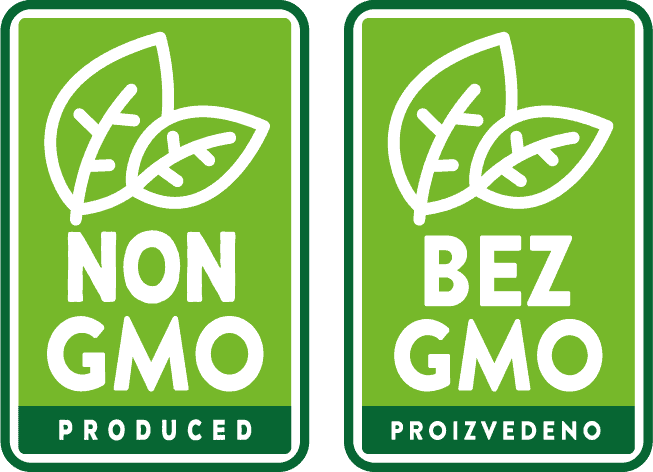
Development of Non-GMO Danube region standard
The Non-GM Danube Region Standard was developed in 2015 with the support of the 15 Ministries of Agriculture within the Danube region, the Donau Soja Association, the Austrian Development Agency (ADA), the German Association for International Cooperation (GIZ),
and the leading German and Austrian institutions for non-GMO certification and labelling such as the German VLOG (Association Food without Genetic Engineering) and the Austrian Platform for GMO-Free Food Products (ARGE Gentechnik-frei) as well as the Environment Agency Austria (UBA).
- Response to consumer demands
- Application of the Non-GMO Standard and Label
- The benefits of non-GMO labelling
- In Europe 85% of livestock animals are daily fed with genetically modified (GM) feed. Products obtained from these animals (meat, milk, eggs) are not labelled as GMO.
- However, 74% of consumers in Europe are against GMO-food and would rather choose products with a non-GMO label (European Commission Study, 2016).
- In response to consumer demand, the first non-GM standards were developed 20 years ago, allowing certification and labelling of food and feed and reached more than 10,000 non-GMO labelled products in EU market nowadays.
- The non-GMO market is booming, with constant increase of non-GMO certified and labelled products and sales.
Label “NON GMO Produced” might be applied to:
- Food products of animal origin (eggs, meat, milk, processed products, etc.)
- Food products of plant origin (oils, flours, pasta, tofu, etc.)
- Feed products
Label “NON GMO Produced” guarantees that:
- No genetically modified (GMO) ingredients were used in the production process
- Animals were fed with non-GMO feed
- The final product of plant origin is non-GMO
- Ensures local agricultural and rural development through protection of local non-GMO farmers and feed industry by creating non-GM market and better prices for farmers
- Supports development of the local economy through local soya processing
- Creates short, high-quality value chains via vertical integration (local processing on farms and non-GMO livestock production)
- Provides options for the local non-GMO livestock sector as well as the feed and food industry in SEE (where plenty of local non-GMO feed is already in use) to differentiate themselves from cheaper imports of meat, milk products (mostly GMO fed)
- Provides a transparent market for consumers and the option to choose non-GMO quality
- Promotes regional trade and adds value to the local agriculture and food sector
Standard Development and Standard Revision
Latest Revisions
Donau Soja has started the latest revision process of the Donau Soja / Europe Soya Standard in August 2023 and concluded it in December 2023.
Why a revision
The regular revision of our standards is a commitment to continuous improvement. We are continuously collecting feedback by our members and partners on how to improve the standards, additional suggestions for improvement derive for example as part of benchmarking procedures.
The main purpose of the standard revision 2024 was to further align the Donau Soja / Europe Soya standard with legal requirements. This refers to the EU Deforestation Regulation (EUDR), which entered into force on 29 June 2023 and will be applicable form harvest 2024 as well as the EU Common Agricultural Policy (CAP) for the period 2023-20227. Further technical adaptations were implemented.
In the course of the standard revision process Donau Soja has therefore
aligned the Donau Soja / Europe Soya standard with relevant requirements of the EU Deforestation Regulation (EUDR)
aligned the Donau Soja / Europe Soya standard with relevant requirements of the EU Common Agricultural Policy (CAP) for the period 2023-2027
implemented technical/editorial changes
Standard Development
Over the past decade, Donau Soja has been an influential force in promoting the production and marketing of non-GMO, European soya.
With two standards for sustainable, non-GMO and European soy, Donau Soja and Europe Soya, the organisation has created two certification systems that are broadly recognized as leading high-quality standards in this area. The coming years, Donau Soja aims to expand its work to other (protein) crops, to accelerate and strengthen the transition towards a more balanced crop rotation in Europe. One of the steps foreseen is the creation of a certification system for multiple crops in line with the requirements of the EU Renewable Energy Directive (RED).
DONAU SOJA EU RED STANDARD
The development of the Donau Soja EU RED standard began in January 2023 with the establishment of the project team and the ad hoc Standard Working Group. Since the Donau Soja EU RED Standard is intended to meet the requirements of the EU Renewable Energy Directive the main goal of the Standard Working Group was to provide expertise and inputs. During the course of the Project so far the Standard Working Group met twice in virtual meetings. The Standard Working Group was led by the Donau Soja Technical Standard Committee and supported by the expertise of Dutch consultancy Schuttellaar and Partners. The Donau Soja Technical Standard Committee prepared draft documents based on inputs by the Standard Working Group and provided them to the Donau Soja Board and Presidium for approval. The next step is to submit the standard documents to the European Commission.
For further information please contact standard@donausoja.org.
Inspection systems
Donau Soja and Europe Soya certification guarantees a complete monitoring of Donau Soja and Europe Soya produce from farm to consumer.
The inspection system of the Donau Soja and Europe Soya Standard is defined in the “Core Principles of Inspection (Overview)” as part of Donau Soja and Europe Soya Standard.
Three-stage inspection system:
Self-monitoring within the companies, and obligatory quality assurance schemes during the processing stages
External certification: independent certification bodies perform audits on site and issuing valid Donau Soja/Europe Soya certificates only to compliant companies
Integrity programme: on a regular basis, Donau Soja Organisation performs integrity audits carried out by trained staff, or in cooperation with external certification bodies or external experts
- Risk-based Donau Soja Inspection System
- Traceability throughout the supply chain
- Donau Soja and Europe Soya Guidelines
The Donau Soja inspection system is risk-based. Different risk categories are applied to determine the risk level for the cultivation of soya bean and the individual risk for all other certified companies in the supply chain.
The risk categories are the baseline for the determination of the frequency of external inspections and supervisory inspections as well as the applicability of certain additional quality assurance requirements (e.g. GMO analysis, pesticide analysis). The risk assessment and audit frequencies are summarised in Annex 4 “Risk-based Donau Soja Inspection System” of the Donau Soja and Europe Soya Standard.
The Donau Soja and Europe Soya traceability system guarantees that certified products are segregated from non-certified sources at each stage of the supply chain. The traceability system comprises all certified companies registered in the Donau Soja IT database, as well as our partners who are listed on our website as certified partners. To ensure the traceability of raw soya beans, an IT-based lot certification system is in use. Certificate of traceability may additionally be issued by the primary processor to the marketer.
The Donau Soja and Europe Soya guidelines provide the detailed requirements for the implementation of the inspections system for soya beans cultivation and operations as well as for risk levels and frequency of inspections. It provides the details for complete monitoring of the origin of the produce and for implementing a non-GM status along the entire processing chain.
Operations already certified by Donau Soja Organisation can be found here, certified products here.
For inquiries, please contact our quality management at quality@donausoja.org
Certification bodies
NON-GM DANUBE REGION STANDARDS
Donau Soja certification bodies constitute the second stage of the Donau Soja certification system. Donau Soja certification bodies are accredited to ISO / IEC 17065 and authorised by the Donau Soja Organisation to conduct Donau Soja / Europe Soya / Non-GM Danube Region Standard certification. These bodies are commissioned by companies (farmers, agricultural collector, trader, primary processor, compound feed producer, processor, animal keeper, etc.) to conduct external inspections and certifications.
The following certification bodies are currently approved for our standard(s):
DONAU SOJA AND EUROPE SOYA
- ABG – Austria Bio Garan tie GmbH / agroVet GmbH (AT-DS-01)
- Aciter Inspection LLC (UA-DS-02)
- Bioinspekt d.o.o. (HR-DS-01)
- Bureau Verit as d.o.o (SVN-DS-02)
- CERES GmbH (DE-DS-03)
- Control Union Certifications B.V. (NL-DS-01)
- CSQA Certificazioni S.R.L. (IT-DS-01)
- FoodChain ID Certification Ltd. (UK-DS-01)
- Jugoinspekt – Novi Sad d.o.o. (SRB-DS-03)
- KIWA Agri Food (UK-DS-02)
- LACON GmbH Germany (DE-DS-01)
- Organic Control System (SRB-DS-01)
- Organic Standard Ltd (UA-DS-01)
- ProCert AG (CH-DS-01)
- QAL GmbH (DE-DS-02)
- SGS Austria Controll – Co. GmbH (AT-DS-02)
- SGS Beograd d.o.o. (SRB-DS-02)
- SLK GesmbH (AT-DS-03)
NON-GM DANUBE REGION STANDARDS
- Bioinspekt d.o.o. (HR-DS-01)
- Organic Control System (SRB-DS-01)
- SGS Beograd d.o.o. (SRB-DS-02)
Certified partners
Find our certified partners here.
Certification requirements
The Donau Soja and Europe Soya guidelines are based on the continuous certification of Donau Soja and Europe Soya products from the farm to the consumer.
Certification of the participating partners by external certification bodies (approved by Donau Soja Organisation) begins with primary agricultural collector including the suppling farmers and ends with the marketer.
All operators downstream of the soya bean farmer (e. g. agricultural collectors, traders, primary processors, compound feed producers, animal keepers, food processors or marketers) who participate in the Donau Soja and Europe Soya programme must sign an inspection contract with a certification body recognised by the Donau Soja Organisation in order to gain certification.
Depending on the risk level, certification is not always required for soya bean farmers. However, by signing the Declaration of Self-Commitment for farmers and participation in a group certification with their primary agricultural collector, compliance with the Donau Soja and Europe Soya requirements is assured.
To ensure traceability, a lot certification system is in use for trading/transportation of Donau Soja or Europe Soya soya beans from the primary agricultural collector through to the primary processor. Lot certificates are usually issued at the seller and accompany the produce to the buyer. Particular care should be taken to ensure that produce is purchased and sold with a valid lot certificate only, as otherwise the soya beans cannot be recognised as Donau Soja or Europe Soya produce. Lot certificates are only required for soya beans, not for processed soya products or compound feed. Further information is provided in our DOWNLOAD section.
Certificates of Traceability additionally confirm traceability and compliance with the Donau Soja or Europe Soya requirements (including non-GM and sustainability criteria) of processed soya products (such as meal, oil, protein concentrate, protein isolate and lecithin). On a voluntary basis, soya processors can request issuance of such certificate by their independent certification body. It is valid for the specific lots as listed on the certificate.
Apart from the general requirements, the guidelines include particular requirements for the following participants in the system:
